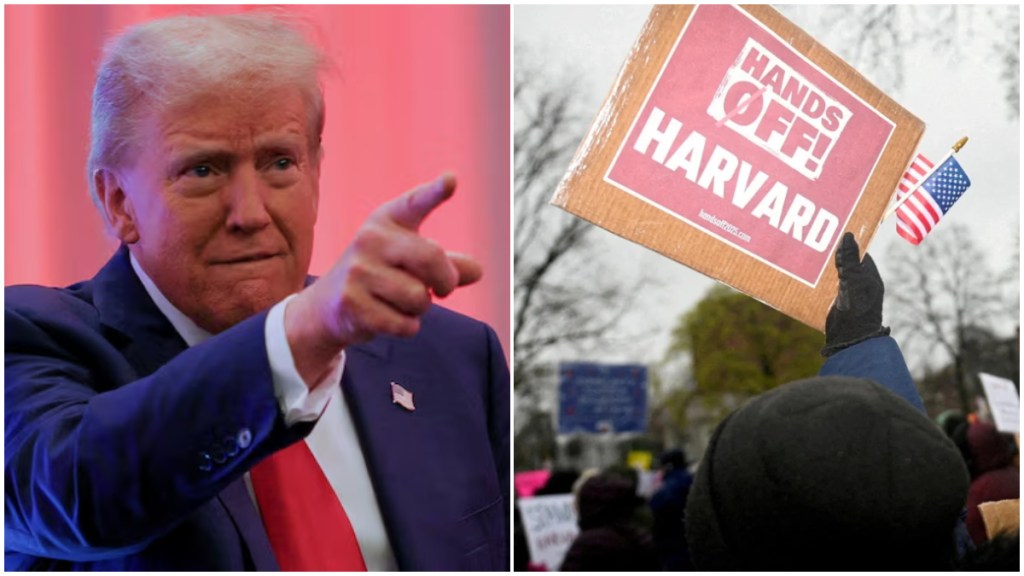In January 2025, Trump takes office as President of the United States and, among other campaign promises, commits to cracking down on pro-Palestinian demonstrations, which he understands as antisemitic. It is undeniable that there is antisemitic content in many pro-Palestinian protests, but generalizing in this way is malicious, as it also suppresses protests that respect human rights and simply call for an end to aggression. Regarding the Israeli-Palestinian issue, nuance is vital — and lost in generalizations.
It is worth considering why such a generalizing behavior exists. One might reasonably argue that it stems from a specific heuristic of the American right — mental shortcuts common to the human mind that conserve energy and optimize mental processing but can also lead to misinterpretations, phobic behaviors, and inappropriate responses, as is the case here. One could also argue a historical American commitment to preserving the State of Israel and the rights of Jewish people as a whole. Additionally, one could point to the unique and strategic relationship between the two countries, as Israel serves as a useful ally in a contentious region.
Perhaps all these answers are not only possible but correct, each contributing to the mosaic of the situation. Still, I would like to offer another reason, less commonly mentioned in mainstream media but, in my view, deserving of attention: the authoritarian alliance. As I argued in more depth in a previous column titled “Interdependence and Its Empty Promises” (recommended for further details), contemporary regimes with authoritarian tendencies tend to support one another in mutual aid.
In any case, the promise to repress pro-Palestinian demonstrations was fulfilled in January of this year through executive orders (directly from President Trump) that required universities to monitor their students, especially international ones, and to take severe measures if they were found to be associated with pro-Palestinian movements. The executive orders also targeted DEI (Diversity, Equity, and Inclusion) policies, the flagship of the conservative white Christian right’s “culture war” in the U.S.
In February, the U.S. Department of Justice created a special task force on antisemitism in schools and universities, visiting institutions including Columbia and Harvard. On March 7, the executive branch cut $400 million in funding (federal contracts and subsidies) to Columbia, citing the university’s inaction in combating antisemitism on its campuses. Later that month, the veiled threat of the March 7 action became explicit in a letter from the U.S. Department of Education to other universities visited by the Justice Department’s task force. On March 21, Columbia complied with the Trump administration’s orders by banning the use of masks on campus (to facilitate identification of activists) and authorizing campus police to arrest demonstrators. Furthermore, Columbia appointed a new administrator to monitor the Department of Middle Eastern, South Asian, and African Studies and the Center for Palestine Studies.
If it’s not clear to the reader yet: this is censorship. The lack of nuance between antisemitism and criticism of Israel’s current actions or humanitarian advocacy in the region substantially limits what can be said, researched, or published.
Similar situations have occurred throughout history. Recall, for example, the support given to Hitler’s government by Heidelberg University, which expelled Jewish students and faculty, burned anti-German books, and of course, institutionally censored departments, study centers, research, and pro-Jewish movements. A closer example would be Brazil’s former “University of Brazil,” now UFRJ, an eager supporter of the authoritarian Estado Novo under Getúlio Vargas. It promoted the ideology of “civic education” and ideological control via the Ministry of Education, ensuring professors joined the dictatorship while influencing curricula. History will judge them all.
On March 31, the Departments of Education, Health, and the U.S. General Services Administration announced a review of $255.6 million in subsidies and $8.7 billion in contracts with Harvard — still under the guise of combating antisemitism. On April 11, the Trump administration sent a letter reiterating its demands to Harvard. On April 14, Harvard refused, stating that the university would not give up its independence and constitutional rights, prompting the U.S. Internal Revenue Service (IRS) to threaten to revoke Harvard’s tax-exempt status and begin freezing research funding. From that event, two sides of the conflict became clear: the authoritarian Trump administration versus Harvard’s fight for intellectual independence and freedom.
Following that, several other dates marked new funding freezes and shutdowns — a process devastating for the country’s technological development — until, on May 22, Kristi Noem, U.S. Secretary of Homeland Security, revoked the university’s certification under the SEVP (Student and Exchange Visitor Program), threatening the future of international students and faculty. Under this policy, all international students — including those currently enrolled — will have their visas suspended from now on. A federal judge issued an injunction to block this measure, and the dispute may ultimately be decided by the Supreme Court.
The disproportionate use of the “antisemitism threat” as a pretext for authoritarian action is clear. So is its misplaced focus on immigrants and anti-Trump ideologies. Even more evident is the attack on an institution that could be a political adversary — an institution older than the independent U.S. itself, and historically responsible for educating presidents and decision-makers around the world. In an analysis published by GZERO Media, Ian Bremmer argues that the confrontation itself seems to be the true objective of the adopted strategy. Trump seems to understand that institutions like Harvard — unlike state actors such as China — lack the institutional tools to respond symmetrically. Moreover, Trump recognizes that by provoking a defensive reaction from the Democratic Party, especially in favor of a university seen as a symbol of the progressive liberal elite, he strengthens the cohesion of his electoral base — particularly in moments of economic instability, such as rising inflation expectations. The targeting of Harvard fits into a populist logic of symbolic confrontation with the so-called “elites.”
This kind of maneuver has been used in other areas before: for example, by carrying out summary deportations of undocumented immigrants, the government forces political opponents to defend individuals that the Trump narrative often — without evidence — links to criminal organizations. The political message Trump constructs is direct and effective: while Democrats are on the side of illegal immigrants and alleged criminals, he stands for the “common American.”
As a consequence, these actions directly compromise the United States’ ability to attract global talent (or even to prevent the loss of its own skilled workforce), especially in the fields of science and public health. The signal that foreign students will not enjoy the same constitutional protections as American citizens may discourage highly qualified academics from coming, negatively impacting the country’s scientific output and long-term international leadership.
If Columbia finds its historical peers in UFRJ and Heidelberg, Harvard’s peers are others — beginning with the university recently mentioned by The New York Times precisely due to parallels with Harvard’s current situation: the Central European University (CEU). Founded in 1991 to promote democracy, human rights, and critical thinking in Central and Eastern Europe after the collapse of the Soviet bloc, CEU has a recent history of anti-authoritarian struggle from which Harvard can draw useful lessons. Created through the efforts of philanthropist George Soros — a Hungarian Jew and survivor of the Nazi invasion and the communist regime, who later achieved financial success in England and the U.S. (and is therefore the target of vast autocratic, often antisemitic, conspiracy theories) — CEU is today one of the ten most prestigious universities in Europe.
In the late 1980s, the Open Society Foundation — another educational branch of Soros’s democratic efforts — financially supported the studies of another famous Hungarian: Viktor Orbán. Starting in 2010, with Orbán’s rise and his authoritarian government in Hungary, CEU faced increasing legal and political restrictions, culminating in a 2018 law that made its continued presence in Budapest impossible. Though the university complied with all international higher education standards, it was accused of operating illegally. In 2019, CEU moved its headquarters to Vienna, Austria, where it already had plans for a branch. Today, the university remains in “exile” in a former bank building in Vienna’s 10th district, still operating under the same mission. As The New York Times article suggests, there are always three options: exile, fight, or stay silent. CEU lacked the resources for the second and the cowardice for the third. So exile was its path.
Another interesting historical parallel is the Institute for Social Research at the University of Frankfurt, which in the 1930s opposed Nazism and found refuge — ironically — at Columbia University (the same one that today collaborates with the Trumpist regime). In times of global democratic backsliding and a new alliance of authoritarian populisms, the role of universities becomes crucial once more — as spaces for critique, diversity, and political imagination. Harvard, now under siege, may find in CEU, in Frankfurt of the 1930s, and in all those who refused to kneel, not just historical examples but a genealogy of resistance to which it now belongs.
The remaining question, however, is a troubling one: how many other universities will choose silence — or worse, collaboration? And how many will be willing to pay the price for not remaining silent? As always, the answer will say more about the future than about the past.
References:
Blinder, A. (2025, June 8). Harvard’s battle is familiar to a university the right forced into exile. The New York Times.https://www.nytimes.com/2025/06/08/us/trump-harvard-hungary-orban-george-soros.html
Bremmer, I. (2025, June 3). Trump’s Harvard crackdown is good politics, but his war on global talent will cost America dearly. GZERO Media. https://www.gzeromedia.com/by-ian-bremmer/trumps-harvard-crackdown-is-good-politics-but-his-war-on-global-talent-will-cost-america-dearly
Cser, A. (2007). Kleine Geschichte der Stadt Heidelberg und ihrer Universität. Karlsruhe: Verlag G. Braun.
Department of Education, Department of Health and Human Services, & General Services Administration. (2025, April 11). Letter sent to Harvard University outlining conditions for maintaining federal research funding. Harvard University. https://www.harvard.edu/research-funding/wp-content/uploads/sites/16/2025/04/Letter-Sent-to-Harvard-2025-04-11.pdf
Molinero Jr., G. R. (2025, May 30). Interdependência e suas promessas vazias. DPolitik. https://dpolitik.com/blog/2025/05/30/interdependencia-e-suas-promessas-vazias/
Queiroz, A. C. B. (2021). As memórias em disputa sobre a ditadura civil-militar na UFRJ: Lugares de memória, sujeitos e comemorações. Tempo, 27(1), 185–203.
The White House. (2025, January 29). Additional Measures to Combat Anti‑Semitism (Executive Order No. 14188). https://www.whitehouse.gov/presidential-actions/2025/01/additional-measures-to-combat-anti-semitism/
Trump promises crackdown on pro‑Palestinian protests if elected. (2024, May 28). Al Jazeera. https://www.aljazeera.com/news/2024/5/28/trump-promises-crackdown-on-pro-palestinian-protests-if-elected
U.S. Department of Education. (2025, March 7). DOJ, HHS, ED, and GSA announce initial cancelation of grants and contracts to Columbia University worth $400 million [Press release]. https://www.ed.gov/about/news/press-release/doj-hhs-ed-and-gsa-announce-initial-cancelation-of-grants-and-contracts-columbia-university-worth-400-million
U.S. Department of Education, U.S. Department of Health and Human Services, & U.S. General Services Administration. (2025, March 31). Agencies announce review of contracts and grants with Harvard University amid anti-Semitism concerns [Press release]. https://www.ed.gov/about/news/press-release/doj-hhs-ed-and-gsa-announce-initial-cancelation-of-grants-and-contracts-columbia-university-worth-400-million
U.S. Department of Health and Human Services, Office for Civil Rights. (2025, May 22). OCR Joint Notice of Violation to Columbia University [Notice of violation]. https://www.hhs.gov/hipaa/for-professionals/compliance-enforcement/agreements/ocr-joint-notice-of-violation-to-columbia.html
U.S. Department of Justice. (2025, February 3). Justice Department announces formation of task force to combat anti‑Semitism [Press release]. Office of Public Affairs. https://www.justice.gov/opa/pr/justice-department-announces-formation-task-force-combat-anti-semitism



